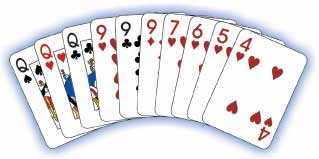Back in the 1930s, Gin was a minor branch of the Rummy family tree when suddenly Hollywood stars embraced the card game. Gin Rummy quickly became a national craze and has remained popular ever since. Here's how to play:
Number of players: Two
Object: To meld your cards as quickly as possible.
The cards: Standard 52-card deck. Aces are always low.
Playing: Draw high card to choose dealer. Deal ten cards to each player. The dealer starts the discard pile by turning one card faceup. This is the first upcard. The rest of the cards are placed facedown to serve as the stock.
The opponent of the dealer has first refusal of the first upcard. If taken, the player then makes a discard. If refused, the dealer has the opportunity to take it. If neither wants this card, the opponent draws the top card from the stock and discards.
Turns alternate. You may either take the top discard or the top card from stock. Sort your cards into melds if you are able and then discard. If it is your turn, and you have taken a card, and all your cards except one card can be arranged into melds, say, "Gin."
Make your final discard facedown with that mismatched card and put your hand faceup on the table. Laying off is not allowed after gin is reached (see below).

©2006 Publications International, Ltd.
A gin hand is usually composed of three melds
like this one in which three cards match
in two melds and four cards match in one meld.
|
Knocking: You can also end play before your opponent reaches gin by "knocking." After picking up a card during your turn, discard a card facedown and rap on the table or say, "Knock." You must place your melds faceup on the table, and put your unmatched cards into a separate pile beside them. The unmatched cards are called "deadwood." Total deadwood points can't be greater than 10 points (see "scoring").
It is a good idea to plan a knock as early in the game as you can before your opponent has exchanged many cards from his or her hand. With a hand of  10-
10- 9-
9- 8-
8- 7-
7- 6-
6- K-
K- K-
K- K-
K- 6-
6- 3, your deadwood adds up to 9 points -- a score that your opponent might possibly beat late in the game. Thus, knocking isn't advisable in that situation.
3, your deadwood adds up to 9 points -- a score that your opponent might possibly beat late in the game. Thus, knocking isn't advisable in that situation.
Laying off: If you knock, your opponent may lay off as many cards as possible onto the melds you've tabled. For example, laying off a  5 to a
5 to a  8-7-6 run or a
8-7-6 run or a  K to
K to  K-
K- K-
K- K set. This reduces your opponent's count of deadwood (see below).
K set. This reduces your opponent's count of deadwood (see below).
Scoring: When tallying deadwood, aces count one point, picture cards count 10 points, and all other cards are scored at face value. If you gin, your score is the total of your opponent's deadwood points and a 25-point bonus. If you knock and your deadwood is less than your opponent's deadwood score, you receive the difference between the two deadwood scores.
If you knock and your opponent's deadwood count is equal to or lower than your deadwood count, your opponent receives a 20-point bonus for the "undercut," plus the difference in the deadwood scores. If your opponent manages to lay off all unmelded cards, that player receives a 25-point bonus for "ginning off" and the difference in the deadwood scores.
The loser of the game deals the next hand. In a game in which two cards are remaining in the stock and no player knocks or can make gin, the hands are thrown in and no points are scored. The dealer then redeals. A typical score for reaching Gin is 100 points.
Tips: Gin is a good game for memory training: It will pay to recall which cards have already been played, especially the ones taken by your opponent. Be aware, however, that your opponent will also notice the discards you pick up!
When involved in a game:
- Don't pick up a discard unless it gives you a meld or unless you have a very poor hand and your pick opens up a few chances. An exception might be to pick up a low-count discard (an ace or deuce) when you have a bad hand and a safe discard to make.
- Don't hold on to a high melding chance that only one card can fill. For instance, don't hold on to
 10-
10- Q if you can draw any better or lower cards.
Q if you can draw any better or lower cards.
- Don't expect to find a third ace when you have two unless you get lucky and draw it from the draw pile. That's not a card your opponent would discard except with a very good hand.
- Don't play for Gin when you can knock early.
If you want to try another advanced version of Rummy, the next section will review the basics of Knock Rummy, in which you need to knock and stop play when your count of deadwood or unmatched cards is less than your opponents'.
